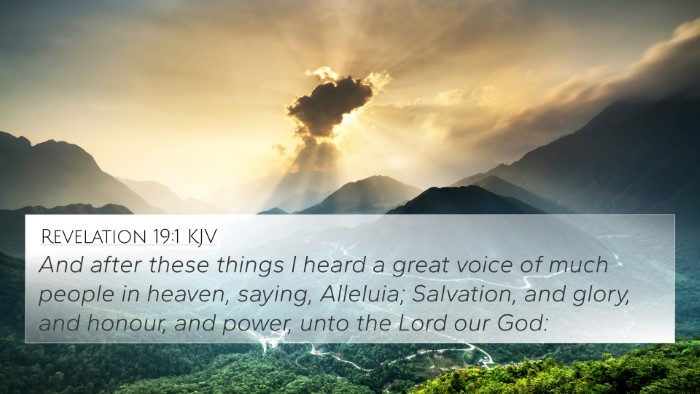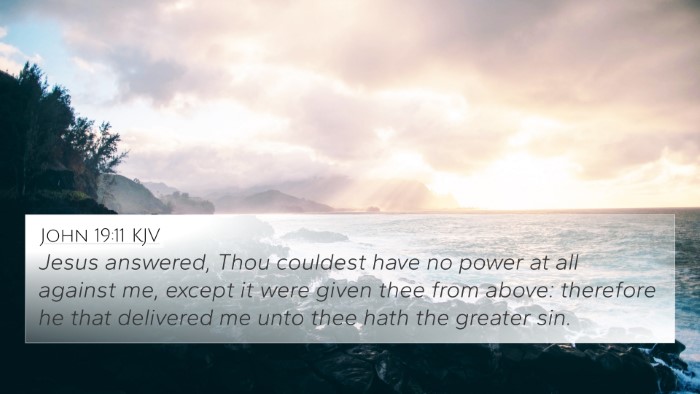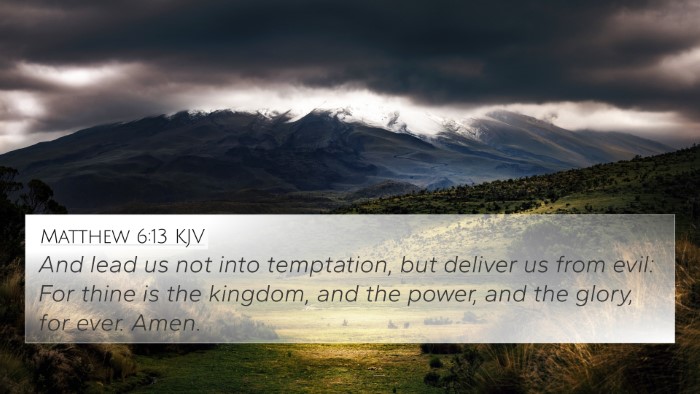Psalms 62:11 - Meaning and Interpretation
Psalms 62:11 states, "God has spoken once; twice have I heard this; that power belongs to God." This brief but profound verse encapsulates a key theme within the Psalms: the sovereignty and omnipotence of God.
Contextual Analysis
This verse is part of a larger psalm that focuses on trust in God amid adversity. The psalmist emphasizes reliance on God rather than on earthly powers or wealth.
Commentary Insights
-
Matthew Henry:
Henry emphasizes the certainty and clarity of God's communication. He points out that when God speaks, it should assert confidence in His authority. The statement "once" and "twice" highlights the idea of repetition for emphasis, showing that God's power should not be forgotten.
-
Albert Barnes:
Barnes explains that this verse emphasizes the singular focus on God's power. The phrase "twice have I heard this" suggests both the audibility and the impact of God's message on the psalmist's heart, compelling him to trust in God's might and justice.
-
Adam Clarke:
Clarke highlights the idea that God's power is not only supreme but also a source of comfort for believers. He suggests that the repetition underscores the certainty of God's truth. Clarke further connects this theme with other scriptures that affirm God's omnipotence.
Key Themes
Several themes emerge from Psalms 62:11:
- The Sovereignty of God: The verse affirms that ultimate authority resides with God.
- Trust in Adversity: The psalmist teaches that during challenging times, believers should place their trust fully in God.
- The Assurance of God’s Communication: God’s messages to humanity are clear and should foster confidence.
Cross-Referencing Bible Texts
This verse connects with several other scriptures, enriching the understanding of its meaning:
- Job 36:22: "Behold, God is exalted by his power." - A direct acknowledgment of God's sovereignty and might.
- Isaiah 40:28: "The Creator of the ends of the earth does not grow faint or weary." - This verse mirrors the theme of divine omnipotence.
- Psalm 62:1: "For God alone my soul waits in silence; from him comes my salvation." - Precedes and supports the verse by emphasizing reliance on God.
- Matthew 28:18: "All authority in heaven and on earth has been given to me." - Connects the idea of divine power from Old to New Testament.
- 1 Corinthians 1:25: "For the foolishness of God is wiser than men, and the weakness of God is stronger than men." - Highlights God's strength and wisdom.
- Psalm power: "God is our refuge and strength." - Reinforces the belief in God’s protective and powerful nature.
- Revelation 1:8: "I am the Alpha and the Omega," says the Lord God, "who is and who was and who is to come, the Almighty." - Affirms God's eternal power.
Thematic Connections
Psalms 62:11 serves as a node for many thematic Bible verse connections. The theme of divine power resonates throughout the scriptures, linking various narratives and teachings:
- Faith and Trust: From Psalms to the New Testament letters, the call to trust God's power is perennial.
- The Nature of God: Discusses attributes of God as powerful and sovereign across different books.
Cross-Referencing Tools and Methods
To fully appreciate the connections between this and other verses, tools for bible cross-referencing can be invaluable. Utilizing a bible concordance or bible cross-reference guide helps uncover deeper meanings and relationships among texts.
Conclusion
Psalms 62:11 stands as a powerful testament to God's authority and the necessity of recognizing His power in our lives. Through this verse, believers are reminded to place their trust firmly in God amidst all circumstances. The richness of this short verse unfolds as one dives into the larger narrative of scripture, establishing profound connections between Bible verses and sharpening our understanding of God’s character.











